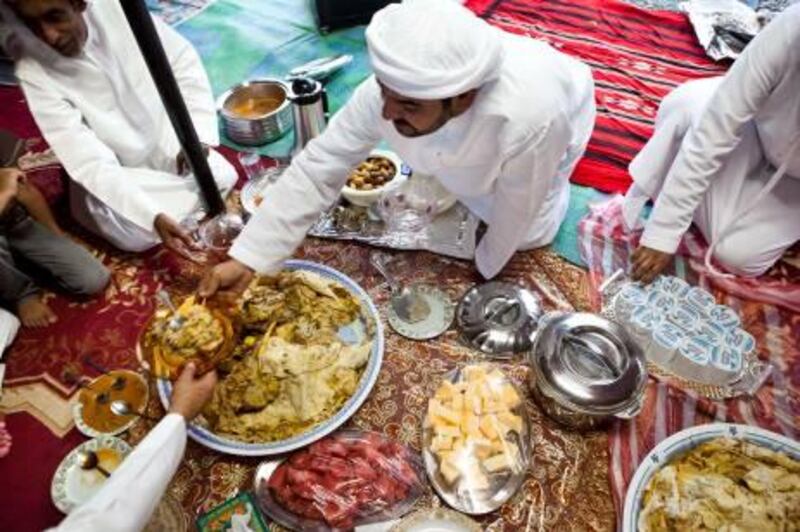AL AIN // Klaithem Al Darmaki remembers when she used to come home from school to a homemade Emirati feast. Ten years later, she comes back from work to Indian, Italian or Chinese.
As the country has developed rapidly over the past few decades, some routines have been eroded, she says - and some traditional Emirati dishes have been all but wiped out.
Special report: The Desert Survival Guide
The desert is a tough place to live. For generations, people survived through the UAE's sweltering summers by managing to eke out limited and hidden food, water and shelter. Our reporters look at how they managed it, what they ate – and how those secrets of survival still affect the lives of ordinary Emiratis today.
[ More from The National on desert survival ]
"There weren't a lot of dishes in the past, but even so, now it is hard to cook them, the ones who can are the older Emirati women," says the 24-year-old from Al Ain.
"Everything used to be made by hand, and mothers back then used to cook, with their daughters beside them learning."
But the days when mothers woke early to prepare khobes el salona thareed - a type of bread which would take most of a day to prepare on an old oven on the ground called tawa - have become a thing of the past.
"Now in most cases the maid cooks, and each daughter is in her own world in a room the other side of the house," she says.
Almost four decades ago, when tribes lived closely together in the desert, neighbours enjoyed strong ties. All females would gather together to prepare food for their families or for the whole tribe during special occasions.
When it came to weddings, the feast would be prepared by the men.
"Some older men still know how to cook harees [a meat and rice dish]," says Maryam Al Ashkare, a 23-year-old from Al Ain. "They used to make bread, meat, and harees during weddings.
"Because they would need a big fire to cook, men used to cook, not women. There was a much better connection between families then."
All cooking and eating would be done on the ground, she says, with some delicacies even made underground.
"Tanor meat [a lamb dish] used to be very popular," she says. "We would wrap the meat in khesha, made of palm trees, and dig a deep hole in the ground. We would start a fire there and bury the meat two days. The meat would come out delicious."
Another meal made underground was chicken. "The chicken would be wrapped in aluminium, and then we would dig a hole in the ground, start a fire, and leave it there for 30 minutes to an hour," she says. "It comes out like barbecue chicken."
All the meat was raised locally, she says. "The slaughtered animals would all come from the farms - our own farms, so it would be fresh."
But both dishes, once eaten every day, have now faded into obscurity.
"We only make them during special occasions or at parties, because it is part of our traditions, and we should," says Ms Al Darmaki.
Even when they are made, the dishes have been adapted to modern tastes and ingredients. "Like sarona bread, it is meant to be made with meat and potatoes, but now it is made with tomato salsa, carrots," she says. "Now it is much better. But generally, I don't like the taste of the food - I prefer Chinese, Indian, and Italian."
One change that is beyond the pale, though, is substituting meat with chicken on special occasions.
"It is considered an insult to give chicken instead of meat to other Bedouins," she said. "Meat is more prestigious."
Part of the reason the dishes are disappearing is the general decline of cooking skills among young Emiratis.
"They can just make sandwiches, eggs, burger, but not a full lunch," said Miss Al Ashkare.
"People now have maids and even cooks. Now it is easier to go to a restaurant."
But Noor Kamali, a 20-year-old from Dubai, believes the changes are a natural part of the UAE's development.
"Due to the fact that the old generation travelled to places and got herbs and brought them back with them to the country, we had those dishes," said Miss Kamali. "Now it is happening in a different way. People like to try new things and new dishes."
But even as the dishes are replaced with international food, the traditional way of eating has not changed.
"We still prefer to eat on the ground," said Miss Al Ashkare. "It's easier."






